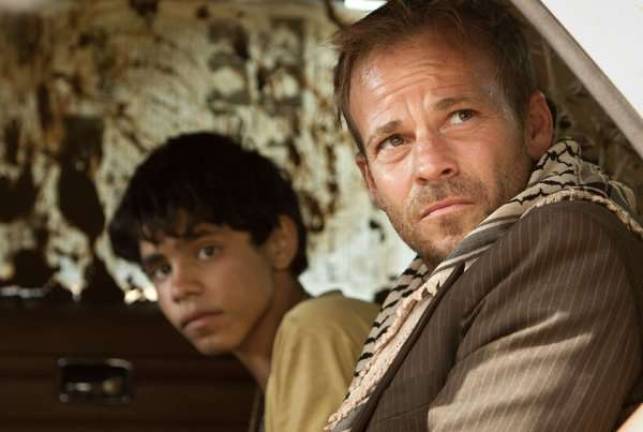The Road to Israel

Zaytoun strains for peace Let's get it out of the way: Zaytoun certainly means well. Eran Riklis's film, about the unlikely bond forged between a young Palestinian orphan and an Israeli pilot in wartorn Beirut circa 1982 is a promising premise that only bears the best of intentions about overcoming conflict. As a work of cinema, however, it is basic and clumsy and ultimately unconvincing. It isn't long before Nader Rizq's script finds twelve-year-old ruffian Fahed (Abdallah El Akal) on the road with Yoni (Stephen Dorff, for once striving for earnestness on the job). The mercurial Fahed, an adolescent guardian of the imprisoned flyer brokers a deal with Yoni to head to flee the Shatila village and head toward his family's home in Israel, with an olive tree in tow to be planted upon their arrival. (This does, however, lend itself to some striking imagery, thanks to cinematographer Dan Lausten's ability to conjure subtly poetic images from his desert settings ? something from which the film's director could learn.) It's then that Riklis' film becomes not just a silly road movie, leaning more toward Ishtar than the Bob-Bing-and-Dorothy movies of yore, but also one riddled with overt symbolism (the title itself translates to olive, as in olive branch, the very hallmark of conflict resolution.) This was something Riklis managed to avoid in his previous work, Lemon Tree. Some of these chapters, particularly when desert animals like donkeys are involved, are humorous. But when real-life threats like landmines and border guards are easily skirted, Zaytoun strains credibility in poignant moments when it needs it the most. This makes the film irresponsible (Hervé Schneid's editing works overtime to rescue them, at times). It is also, oddly, suspense-free. Maudlin as it may sound, I wish that this film came armed with more grit in it. I wish the surrogate father-son relationship between Fahed and Yoni had more obstacles to it. I also wish, for that matter, that Dorff's turn had more muscle to it. How is it that Yoni so easily sheds his strong political prejudices? Dorff never fully commits to the role, and his unconvincing accent further distracts from the film. Watching a more natural El Akal, one-third his co-star's age, I couldn't help but wonder why Dorff had even signed on. I also couldn't help but wonder what Riklis' ultimate intentions were with Zaytoun. Did he want to shed light on current Middle East affairs? To show how frequently the mistakes of the past reappear in the present? As an opportunity for political commentary, Zaytoun falls short early and often. More specifically, as an example to study the ongoing Israeli-Palestinian conflict, its "you can go home again" mentality feels more naïve than optimistic. It is sad that a well-meaning movie about war and relationships can still suffer by not being realistic enough. But, sadly, this is the world we live in. Zaytoun is playing at City Cinemas Village East and Lincoln Plaza Cinemas.